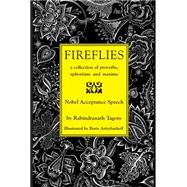FIREFLIES were proverbs, aphorisms and maxims originated in China and Japan and were often written on pieces of silk. Tagore visited Japan and collected them in his notebooks. Each firefly, rarely more than a sentence long, represents a luminous thought on love, life, beauty or God. Each page of this book contains a decorative design by Boris Artzybasheff with the short maxim of Tagore's beneath. The text also includes Tagore's Nobel Acceptance Speech.








